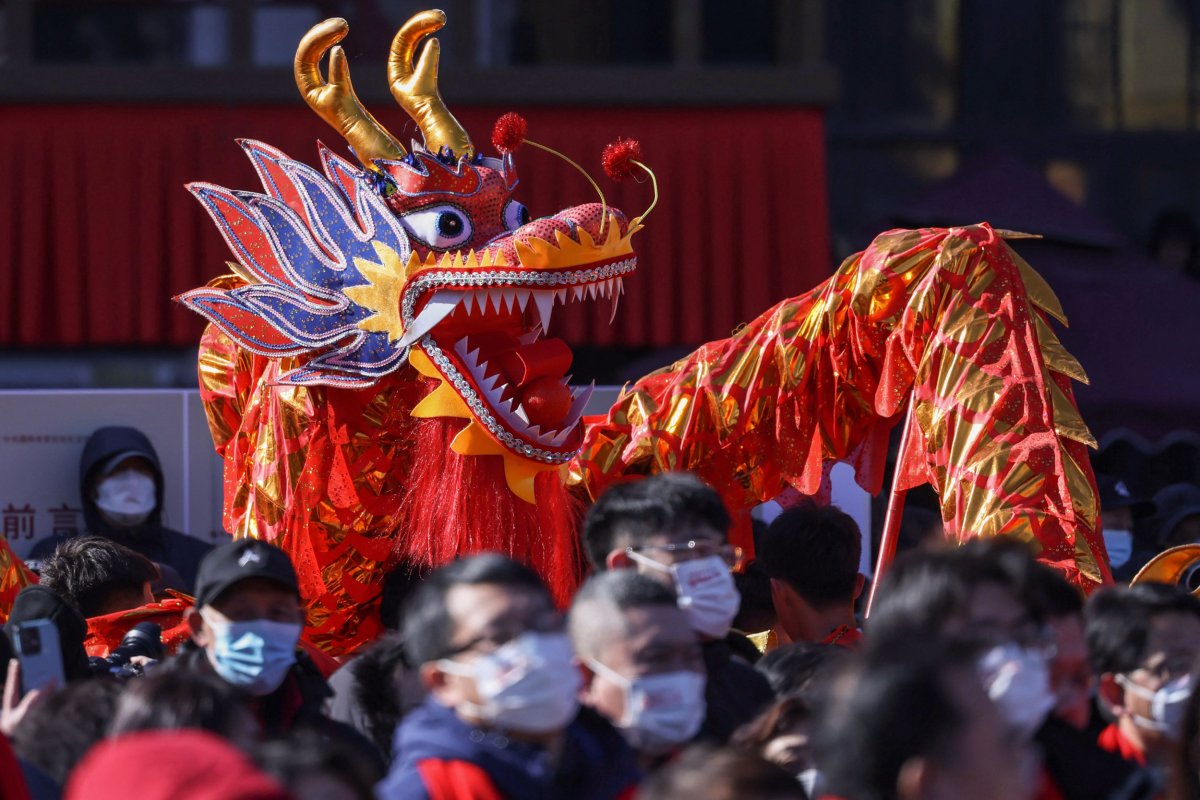With China's fertility rate falling for a second consecutive year, the country is hoping to receive a boost from a celestial ally as the year of the dragon approaches on the Chinese calendar.
In the past, the dragon has been associated with emperors and is a symbol of strength, intelligence and success. Children born under this zodiac sign are traditionally believed to be imbued with these traits.
Figures released by China's statistics bureau on Wednesday showed the Chinese population shrank by 2.08 million people last year, more than double than in 2022, despite government efforts to incentive child-rearing to rescue the country's aging workforce.
"The Chinese zodiac had little effect on births in China until at least 2010," University of Wisconsin-Madison demographer Fuxian Yi told Newsweek, citing China's annual census data.
In 2000—a dragon year—China reported a fertility rate of 1.22 births per 1,000 women, down 0.23 from 1999's year of the rabbit and 0.17 fewer than in 2001, a year of the snake.
However, small spikes of at least 0.5 births per 1,000 women were seen in 2000 in the city of Hong Kong as well as in Taiwan and South Korea. All three observe the Lunar calendar with its 12 zodiacs.
China did enjoy a modest 0.22 bump in its fertility rate in 2012, the previous year of the dragon. Taiwan, Hong Kong, South Korea, and the ethnic Chinese demographic in Singapore also saw small increases, according to Yi's database.
In China, marriages are "strongly and linearly positively correlated with births the following year," he said. The number of marriages rose 4.5 percent in the first three quarters of 2023 after the government abandoned its stringent zero-COVID policies in January.
Chinese officials expect as many as 9.3 million births in 2024—a tick higher than last year's 9.02 million. If the birth rate does rise, however, it will be more due to the end of pandemic-era anti-virus measures than to the zodiac sign, Yi said.
China's statistics bureau did not immediately return Newsweek's written request for comment.
China's declining birth rate, which mirrors trends observed in other East Asian countries, is compounded by an aging workforce, raising concerns about future productivity in the world's second-largest economy, which relies heavily on manufacturing exports.
By 2050, people aged 60 or older are estimated to make up a staggering 40 percent of China's population, Yi said. The rapid increase in the number of senior citizens poses various economic and social challenges for the country.
An aging workforce can lead to a shortage of skilled workers, a decrease in labor supply and increased pressure on social welfare systems. Yi predicted China's graying population would still experience a net decline this year due to deaths, negating any positive growth from births.

China has in recent years introduced policies aimed at encouraging childbirth and supporting families. The central government scrapped its decades-old one-child policy in 2016, and city and provincial governments have offered modest cash subsidies to parents with newborns.
Chinese leader Xi Jinping last year called on the nation to "actively foster a new culture of marriage and childbearing and strengthen guidance on young people's view on marriage."
However, these initiatives appear to have come too little, too late amid changing attitudes among the younger generations of Chinese, who often cite the rising cost of living in major cities as an obstacle to family planning.
A study published last year in the peer-reviewed International Journal of Environmental Research and Public Health found 37 percent of Chinese women residing in urban areas intended to have up to two children. But this figure fell to just 29 percent in increasingly pricy first-tier cities like Beijing, Shanghai and Shenzhen.
Yang Fan, a population researcher at Beijing's Renmin University, told the state-owned China Daily newspaper on Thursday that the United States and parts of Europe had for years been trending toward later marriages and fewer births.
Chinese society was now reaching this stage, Yang said, describing the resulting population decrease as natural.
Uncommon Knowledge
Newsweek is committed to challenging conventional wisdom and finding connections in the search for common ground.
Newsweek is committed to challenging conventional wisdom and finding connections in the search for common ground.
About the writer
Micah McCartney is a reporter for Newsweek based in Taipei, Taiwan. He covers U.S.-China relations, East Asian and Southeast Asian ... Read more
To read how Newsweek uses AI as a newsroom tool, Click here.






